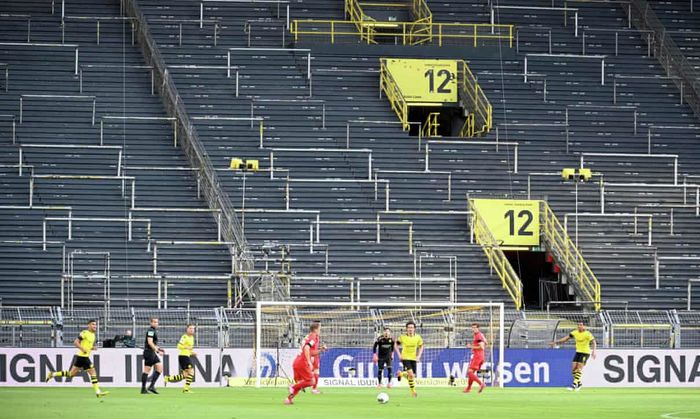‘Football Without Fans Is Nothing’ …Or Is It?
Ben Phillips assesses this famous phrase and looks at how football restarting behind closed doors will impact clubs up and down the leagues.

Football without fans is a phrase that was said by old Celtic manager Jock Stein years ago who regularly spoke of the important role supporters play in the game’s rich culture. But this is not strictly true, at least not for the time being, thanks to the global pandemic of COVID-19.
When football ground to a halt back in March nobody could have predicted the severe impact coronavirus would have on the sport we all love and the changes it would cause to football as we know it.
It is hard to look beyond the lack of supporters watching matches in stadiums...
It is estimated that as a direct result of the pandemic, total losses for Europe’s big five leagues could be anywhere between €3.5 and €4 billion. In England, the Premier League could take a hit of up to €1.25bn, while the 48 clubs that make up League One and League Two are expecting combined losses of somewhere in the region of £50 million. Smaller football league clubs could be potentially severely affected without any matches or match day revenue to help them stay alive.
We’ve recently seen the welcome return of the German Bundesliga on the 15th May, the first country in Europe to start playing competitive football again. Germany’s football crowds are renowned for their colour, energy and noise. German fans put supporters of most clubs in this country to shame and the unique atmosphere is usually one of the Bundesliga’s big selling points.
The return of football in Germany has received a mixed reception from fans as the teams are playing behind closed doors in empty stadiums. For some reason, no matter how important the fixture, how talented the players, or how fantastic the football, matches behind closed doors never feel the same, as it’s like watching a training ground game.

The Premier League, one of the the world’s richest and most watched leagues, returns again now this week, some 100 days since the last fixture. This is welcome news, as it shows that slowly competitive sport is resuming and coming back, but it’s far from normality. Expect to see the introduction of five substitutes, water breaks, disinfected footballs and socially distant celebrations in deserted, soulless stadiums.
It is hard to look beyond the lack of supporters watching matches in stadiums, and it will be interesting to see how games played behind closed doors will affect the quality of the game and the event as time goes on. Football is a sport about emotion, on the pitch as well as in the stands, and players thrive on playing in front of packed out stadiums.
The implications of fans not attending matches...will severely hamper the league clubs outside the Premier League...
The Westminster government’s deputy chief medical officer said the return to normality in football would be “slow” and “measured”, suggesting, as expected, fans will not be allowed into stadiums for a long time.
This is the real concern for league clubs outside the Premier League who rely on match day revenue from fans attending to help them financially, and who don’t have the TV rights that clubs receive in the Premiership to help them get by.
Cambridge United, our local side that play in the EFL Football League Two, have not played a match since 7th March and have seen all their staff and players placed on furlough.
Clubs voted to finish League One and Two early as most clubs deemed that the most sensible option: it would have cost £126,000 to play the remaining nine games for each club, some of which were already struggling financially in general. As of yet the EFL are yet to announce when the Football League will kick off its new 2020/21 campaign.
The implications of fans not attending matches, and the lack of match day revenue, will severely hamper the league clubs outside the Premier League, so let’s hope that normality can be restored and fans are allowed to attend games, filling stadiums with noise and atmosphere in some form safely, in the not too distant future, as it would be a shame to see a football league club go into administration or disappear due to the current climate in the pandemic.
 News / Eight Cambridge researchers awarded €17m in ERC research grants27 December 2025
News / Eight Cambridge researchers awarded €17m in ERC research grants27 December 2025 News / Downing investigates ‘mysterious’ underground burial vault 29 December 2025
News / Downing investigates ‘mysterious’ underground burial vault 29 December 2025 Lifestyle / Ask Auntie Alice29 December 2025
Lifestyle / Ask Auntie Alice29 December 2025 Sport / Hard work, heartbreak and hope: international gymnast Maddie Marshall’s journey 29 December 2025
Sport / Hard work, heartbreak and hope: international gymnast Maddie Marshall’s journey 29 December 2025 Interviews / Meet Juan Michel, Cambridge’s multilingual musician29 December 2025
Interviews / Meet Juan Michel, Cambridge’s multilingual musician29 December 2025









